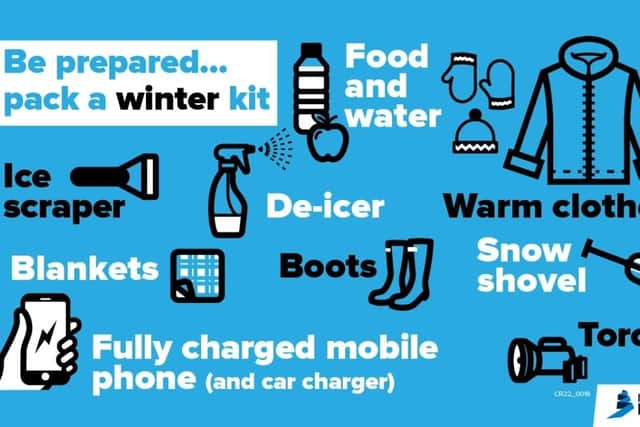National Highways has issued a severe weather alert for snow tomorrow – asking people to reconsider journey
and live on Freeview channel 276
The weather warning means driving conditions will be extremely difficult, especially for larger vehicles and those not equipped with four wheel drive between 9am tomorrow and 8am on Friday in the North West, North East and the Midlands.
National Highways is asking everyone travelling in these areas to consider if their journey is essential and to go prepared.
Advertisement
Hide AdAdvertisement
Hide AdHGV drivers are asked to consider avoiding parts of the road network with steeper than normal inclines, such as in the Pennines. This could potentially lead to their vehicle becoming jack knifed or stranded in the wintry weather.


Where vehicles get stuck it can prevent gritting vehicles getting through to treat the road with salt or to plough snow clear from the road.
National Highways Executive Director of Operations, Duncan Smith, said: "We are well prepared and our gritters have been out in full force since Friday and will continue to treat the roads. We are asking drivers to plan ahead, check the forecast and allow more time for their journeys.”
National Highways’ staff are already out and about this afternoon spreading salt across key routes with plans to treat the motorway and major A roads network throughout any prolonged period of severe weather.
Advertisement
Hide AdAdvertisement
Hide AdNational Highways’ preparation also includes enhanced around-the-clock vigilance and resourcing along key routes such as the M62, A628 and A66 trans-Pennine locations. Staff in the North West are also working with counterparts in Yorkshire and the North East to respond to coordinate the response to drifting snow and any incidents on trans-Pennine routes.
Drivers are advised to take extra care in these areas which are expected to be the most impacted by the severe weather: Yorkshire & North East, A66 Old Spital, M62, A628 and A616, M1 junctions 32 to 41, M606 and M621, M18, A69, A1 (M) County Durham, North West, A66 Old Spital, M62, A628 and A616, A69, M6 Lancaster, A56, M6 Shap, Higher parts of M61, M62 and M6, East Midlands, M1 junctions 26 to 30, A38 Derbyshire, A1 Nottinghamshire, M1 junctions 22 to 23, West Midlands, M5 junctions 1 to 3, M6, A50 Staffordshire, M42.
Sleet and snow in central areas will slowly ease overnight into Thursday with small amounts further accumulating. A new band of rain, sleet and snow will move northwards from the southern Midlands early morning, intensifying as it reaches northern parts of the Midlands by mid-morning, and then expanding across the North West and North East during the afternoon.Accumulations of 2-5 cm are expected for the West Midlands and western parts of the East Midlands before the snow turns to rain from the south from late morning.
However, the snow is expected to be persistent and heavy from Derbyshire/Nottinghamshire northwards, with significant accumulations above 100-150 metres.
Advertisement
Hide AdAdvertisement
Hide AdUp to 5-10 cm is expected to build up quite widely for these elevations over the course of Thursday and overnight into Friday, with at least 10-20 cm for the Trans-Pennine routes and roads around Sheffield/Huddersfield.
There is an increasing risk of 20-30 cm building up on the A628 Woodhead Pass and M62 J21-23. For low-lying routes in the North West and North East, especially near coastal regions, accumulations should be negligible.With widespread 40-50 mph wind gusts also occurring at the same time in the North West, drifting snow is another hazard on exposed routes. Coupled with poor visibility, driving conditions are expected to be challenging, particularly on the Pennines routes and during the evening rush hour.
National Highways, in conjunction with the Met Office, are strongly advising that travel in these areas is likely to be extended or even disrupted. Road users should heed messages on the overhead signs and listen for radio updates. Further information can be found by visiting https://www.trafficengland.com/ or calling the National Highways Customer Contact Centre on 0300 123 5000.
National Highways has lots of advice on its website around travelling in severe weather conditions, including high winds and gales, fog, rain and snow and ice. Visit our travelling in severe weather web page.
You can also view a video with tips for driving in winter.
Top tips for winter driving in snow and ice
Advertisement
Hide AdAdvertisement
Hide AdStick to the main roads where you can and only travel if necessary.
Slow down - it can take 10 times longer to stop in icy conditions.
Use a high gear - this will help avoid wheel spin.
Accelerate gently, using low revs. You may need to take off in second gear to avoid skidding.
You may need up to 10 times the normal gap between your car and the car in front.
Advertisement
Hide AdAdvertisement
Hide AdTry not to brake suddenly – it may lock up your wheels and you could skid further.
Be extra cautious at road junctions where road markings may not be visible.
Look out for gritters spreading salt or using snow ploughs, and only overtake if it's safe to do so.
Comment Guidelines
National World encourages reader discussion on our stories. User feedback, insights and back-and-forth exchanges add a rich layer of context to reporting. Please review our Community Guidelines before commenting.